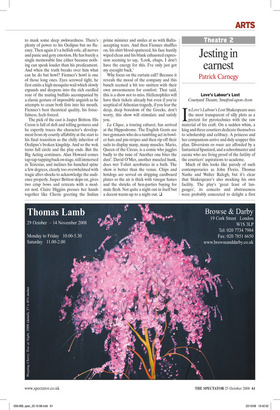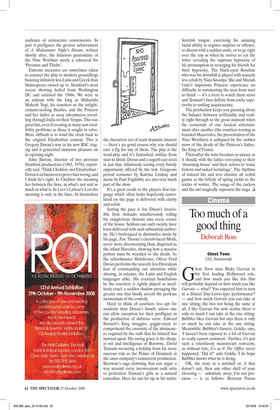Jesting in earnest
Patrick Carnegy
Love’s Labour’s Lost Courtyard Theatre, Stratford-upon-Avon
In Love’s Labour’s Lost Shakespeare uses the most transparent of silly plots as a pretext for pyrotechnics with the raw material of his craft. On a sudden whim, a king and three courtiers dedicate themselves to scholarship and celibacy. A princess and her companions arrive and duly scupper this plan. Diversions en route are afforded by a fantastical Spaniard, and a schoolmaster and curate who are living proof of the futility of the courtiers’ aspirations to academe.
Much of this looks like parody of such contemporaries as John Florio, Thomas Nashe and Walter Ralegh, but it’s clear that Shakespeare’s also mocking his own facility. The play’s ‘great feast of languages’, its conceits and abstruseness were probably concocted to delight a first audience of aristocratic connoisseurs. In part it prefigures the greater achievement of A Midsummer Night’s Dream, written shortly after, the hilarious pantomime of the Nine Worthies surely a rehearsal for ‘Pyramus and Thisbe’.
Extreme measures are sometimes taken to connect the play to modern groundlings boasting infinitely less Latin and Greek than Shakespeare owned up to. Stratford’s most recent showing hailed from Washington DC and satirised the 1960s. We were in an ashram with the king as Maharishi Mahesh Yogi, his courtiers as the enlightenment-seeking Beatles, and the Princess and her ladies as sassy adventurers travelling through India on their Vespas. This was great fun, even if creating as many new credibility problems as those it sought to solve. More difficult is to wind the clock back to the original Elizabethan context. This is Gregory Doran’s way in his new RSC staging and it generated immense pleasure on its opening night.
John Barton, director of two previous Stratford productions (1965, 1978), reportedly said, ‘Think Chekhov, not Elizabethan.’ Doran is in business to prove him wrong, and I think he’s right. In Chekhov the meaning lies between the lines, in what’s not said as much as what is. In Love’s Labour’s Lost the meaning is only in the lines. In themselves the characters are of scant dramatic interest — there’s no good reason why you should care a fig for any of them. The play is the word-play and it’s fantastical artifice from start to finish. Doran and a superb cast revel in just that, hilariously seizing every bawdy opportunity offered by the text. Gorgeous period costumes by Katrina Lindsay and music by Paul Englishby are also very much part of the show.
It’s a great credit to the players that language which often looks hopelessly convoluted on the page is delivered with clarity and relish.
Setting the pace is Joe Dixon’s irresistible Don Armado, mischievously rolling his vainglorious rhetoric into every corner of the house. Seldom can such vacuity have been delivered with such substantial authority. He’s burlesqued in diminutive mode by his page, Zoe Thorne’s cherub-faced Moth, never more disconcerting than, disguised as the infant Hercules, showing how a massive python must be wrestled to the death. As the schoolmaster Holofernes, Oliver Ford Davies performs the scarcely less Herculean feat of commanding our attention while abusing, in extenso, the Latin and English languages alike. His eventual humiliation by the courtiers is rightly played as needlessly cruel, a sudden shadow presaging the greater one that finally arrests the perilous momentum of the comedy.
Hard to think of courtiers less apt for academe than Doran’s bunch, unless one can allow exception for their profligacy in the production of dubious verse. Edward Bennett’s King struggles, goggle-eyed, to comprehend the enormity of the abstinences required by the oath that he himself has insisted upon. His saving grace is the sharper wit and intelligence of Berowne, David Tennant savouring a holiday from his more onerous role as the Prince of Denmark in the same company’s concurrent production. Berowne’s sage clowning that can argue a way around every inconvenient oath suits to perfection Tennant’s gifts as a natural comedian. Here he can let rip in his native Scottish tongue, exercising his amazing facial ability to register surprise or offence, to disarm with a sudden smile, or to go right over the top as when he strives to eat the letter revealing the supreme hypocrisy of his presumption in scourging his friends for their hypocrisy. The black-eyed Rosaline who was his downfall is played with scarcely less relish by Nina Sosanya. She and Mariah Gale’s imperious Princess experience no difficulty in outsmarting the men from start to finish — it’s a treat to watch them score and Tennant’s face deflate from cocky superiority to smiling acquiescence.
The production keeps you guessing about the balance between artificiality and reality right through to the great moment when the crescendo of one farcical entertainment after another (the courtiers wooing as bearded Muscovites, the presentation of the Nine Worthies) is collapsed by the sudden news of the death of the Princess’s father, the King of France.
Thereafter the tone becomes as uneasy as it should, with the ladies retreating to their ‘mourning house’ and their suitors to ‘some forlorn and naked hermitage’. The rhythms of natural life and love chastise all verbal games as the felicity of spring yields to the icicles of winter. The songs of the cuckoo and the owl magically repossess the stage. ❑



















































































 Previous page
Previous page